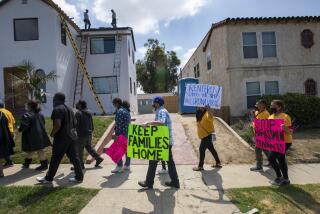Pro Bono Lawyers Entitled to Fees : Law: Appeal court believes more attorneys might do volunteer work if there was a chance of being paid.
- Share via
Lawyers who volunteer to work for free for clients engaged in child custody and other domestic disputes are entitled to be paid for their services, a state appellate court in San Diego has ruled.
Socking a former San Diego dentist for $3,000 in lawyers’ fees, the 4th District Court of Appeal said it believed attorneys might take up more cases on behalf of poor people if odds are that lending a helping hand might ultimately lead lawyers to cash.
Issued Monday, the ruling is the first in California that extends fee rights to attorneys who volunteer in domestic disputes, said Kate Yavenditti, the winning lawyer in the case.
“I think it’s going to help low-income people because I think it’s going to help persuade more attorneys to get involved in cases,” Yavenditti said.
Yavenditti is the sole staff attorney for the San Diego Volunteer Lawyer Program, an agency that aids people who can’t afford a lawyer. Because she can’t possibly handle the thousands of cases that pour in each year, the agency solicits help from attorneys in private practice.
There are no rules compelling private attorneys to take on work pro bono , the legal term for free work. The private bar has a long and occasionally distinguished tradition of working for free--though it’s an ongoing sore spot with bar leaders that most lawyers don’t work pro bono because they want to work for money.
For instance, the Volunteer Lawyer Program takes in about 10,000 cases a year, most of which require only a one-time visit with a lawyer, said Carl Poirot, the agency’s executive director.
Of those 10,000 cases, about 1,200 are domestic disputes that demand ongoing legal aid. But because there aren’t enough volunteer lawyers, the agency turns away “8 of 10 people who ask for help,” Poirot said.
The 4th District Court said in its ruling Monday that the lure of cash might improve that ratio.
The case decided by the appellate court began in 1989, when the Volunteer Lawyer Program filed a bid for child support on behalf of Emily Ward Hayes. After many months of legal wrangling, a judge ordered her ex-husband, dentist James Michael Ward, to pay her support for the couple’s sole child in amounts ranging from $500 to $650 a month.
Arguing that Ward--whose monthly income was $3,000 or more--also had the ability to reimburse the agency for the legal services it performed for Hayes, Yavenditti asked for $3,000 in fees for the agency. Superior Court Judge Federico Castro approved the request.
On appeal, Ward claimed Yavenditti was not entitled to the fees because she was supposed to be working for Hayes for free. The 4th District Court, in an opinion written by Judge Don R. Work, said that claim missed the mark.
Since Ward had the ability to pay the $3,000, he should do so, the court said. When he--and others like him--is forced to pay up, that means financially beleaguered legal services groups can make their services more widely available, Work said.
And making fees available to private volunteer lawyers should make them more interested in taking cases, which should promote “access to the courts” for the poor and “fundamental fairness” in the system, Work said.
Unlike other fields of law in which attorneys have long been able to recover fees--for instance, civil rights litigation--Work said that the lawyer who volunteers in a domestic case need not win the case to get paid.
Judges Richard D. Huffman and Charles W. Froehlich Jr. joined in the opinion.
Neither Hayes nor Ward was available Tuesday for comment. A receptionist at Ward’s former Pacific Beach office said he had sold his dental practice and could not be reached.
More to Read
Sign up for Essential California
The most important California stories and recommendations in your inbox every morning.
You may occasionally receive promotional content from the Los Angeles Times.










